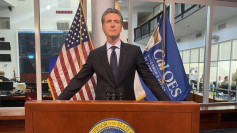The U.S. Senate finally approved the $1.2 trillion infrastructure project on Tuesday with an uncommonly bipartisan vote. The project is meant to provide much-needed funding to rebuild the country's roads and bridges, while also funding climate and internet initiatives.
The bill was approved by a 69 to 30 vote, which included votes from senators who previously opposed to its passing. Republican Senator Mitch McConnell of Kentucky, who had previously stated that he was not in favor of the bill, gave his yes vote along with 18 others from his party.
McConnell said, after the approval, that he was now proud to support the historic bipartisan infrastructure deal. He said its passing shows how both Democrats and Republicans can work together to implement "common-sense solutions" that will benefit all Americans.
U.S. President Joe Biden, who had depended on the bill's passing to push his administration's agenda, said such a deal is what the American people want. Biden thanks all of the Republicans who voted for the bill, adding that they showed "a lot of courage" by giving their yes votes.
Biden had repeatedly expressed his belief that a compromise would be possible and both parties will be able to see how important the deal was. Senators who voted yes to the bill echoed his sentiments Tuesday.
Democratic Senator Kyrsten Sinema of Arizona said the bill's passing was a major step towards "healing" divisions. Republican Senator Rob Portman of Ohio said everyone who worked on the deal should be proud, adding that the bill's success shows that the Senate is doing its job.
The infrastructure legislation is one of the largest to be approved in more than a decade. It is also the largest infusion of funds into infrastructure projects, climate initiatives, and the modernization of the country's power grid and network infrastructure.
As part of the deal, existing infrastructure and transportation programs set to expire next month will be renewed and revamped. About $110 billion will go into constructing new roads and bridges, $25 billion for airports, and $65 billion to expand high-speed internet networks.
With the bill's passing, Democrats are now turning their attention to the passing of their more ambitious $3.5 trillion social policy bill, which tackles issues such as paid family leaves, medical leaves, health, and education.





